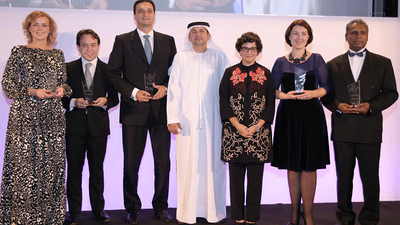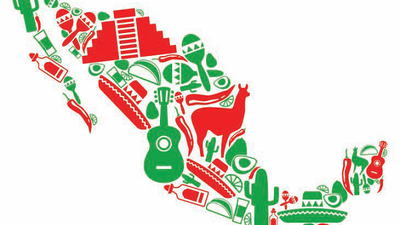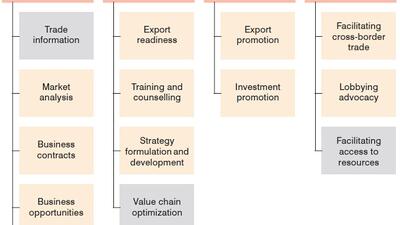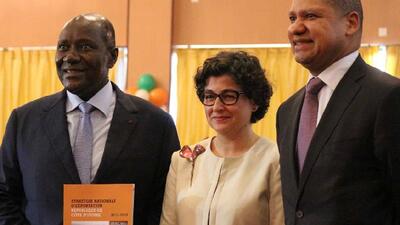Spreading the spirit of entrepreneurship
A little more than five years ago, a new start-up was taking its first steps. It had a clear view of its value proposition and a global market that was ready and wide open. Since that time, it has served more than 30 million customers in 130 countries, but its actual impact is much larger. Like most, if not all, new ventures, Global Entrepreneurship Week started with an idea: What if there was a global movement to inspire people everywhere to unleash their ideas and take the next step in their entrepreneurial journey?
Now, during one week every November, millions of people participate in local, national and global activities designed to help them explore their potential to launch start-ups that bring ideas to life, drive economic growth and expand human welfare. While Global Entrepreneurship Week started as an initiative targeted towards young, nascent entrepreneurs, it continues to expand and reach across the entire entrepreneurial spectrum. Each year:
- Millions of students experience their first taste of start-up culture
- Universities strengthen connections that help them commercialize research from their labs
- Thousands of brand new start-ups spring to life through bootcamps such as Startup Weekend and competitions such as Startup Open
- Researchers and policymakers gather at hundreds of events around the world to examine the underlying policies necessary to promote entrepreneurial growth in the hope of empowering local job creators
To better understand the impact of Global Entrepreneurship Week, it helps to take a step back and look at the perception of entrepreneurship in the not too distant past. Before a surge of interest over the past five years, ‘start-up creation’ was an exclusive concept associated with places such as Silicon Valley and other hotbeds of entrepreneurial activity. Organized venture and angel capital was concentrated in known start-up nations. If policymakers discussed entrepreneurship policy, they were usually focusing on small- and medium-sized enterprises. Lost in a classification by size, the potential of young businesses with high-growth prospects was too often left untapped.
All that has changed. Start-ups are now springing up in the most unexpected corners of the world. Entrepreneurial capital travels to find the most promising start-ups and policymakers are mingling with key start-up ecosystem players in their quest to enable more entrepreneurial success.
These changes are not mere coincidence. They are the result of the democratization and globalization of entrepreneurship. A global race to build the best start-up ecosystem is going on and it is a race that is open to all types of economies and regions. Just look at the list of countries that have most improved the ease of doing business in the World Bank’s Doing Business 2013 report and you will see nations from all economic backgrounds and regions of the world, including Poland, Sri Lanka and Ukraine. Every year, more countries join the ranks of those with comprehensive, cross-sector initiatives, such as Start-up America, Start-Up Chile and LIONS@frica.
These developments are the response to research and data showing that young, growing firms are the main drivers of job creation. The Kauffman Foundation’s research series on firm formation and economic growth provides a closer look at this relationship in the United States. One report in the series, The Importance of Startups in Job Creation and Job Destruction, shows a remarkable fact – all net new jobs in the United States come from start-ups in their first year of existence.
Global Entrepreneurship Week catalyses the awareness of such research and data. Representatives from 37 countries were on hand when the organization was formally launched in London in late 2007. By the time the first Global Entrepreneurship Week came to a close in November 2008, 3 million people had participated in 25,022 activities in 77 countries. Since then, Global Entrepreneurship Week has increased global recognition of entrepreneurs for the role they play in building economies while developing innovative solutions that improve daily life. In 2012, 22 presidents or prime ministers and 93 ministers from 54 countries either supported or participated in Global Entrepreneurship Week. More substantively, at least 11 countries have launched policy packages or broader ‘start-up nation’ initiatives to stimulate native entrepreneurial activity. Each of the 11 countries – Canada, Chile, India, Lithuania, Malaysia, Mexico, Portugal, South Africa, Spain, the United Kingdom and United States – has been actively involved in Global Entrepreneurship Week since it began.
Building cultural capital for entrepreneurship is the greatest legacy of Global Entrepreneurship Week. We are proud that the new generation of entrepreneurs and their peers no longer sees its dreams of doing well and doing good as mutually exclusive; rather these are intertwined. Even in the cultures most impermeable to risk taking, entrepreneurs are gaining respect from their peers.
One success story is Dropifi, a start-up that traces its beginnings back to a Startup Weekend event in Accra, Ghana during Global Entrepreneurship Week 2011. In the span of one weekend, Dropifi’s co-founders built a platform from customer discovery to idea validation. The start-up’s solution replaces ‘contact us’ buttons with a smart widget that allows companies to better analyse and organize incoming messages. Companies can then learn more about the people sending messages and whether the message content trends positive or negative. Dropifi took top honours in the local competition and continued working throughout the year to refine the platform and garner additional recognition from Forbes, CNBC, DEMO and others. One year later, it was selected ahead of 400 start-ups from 56 countries and named the grand prize winner of the Startup Open, winning an all-expenses paid trip to Rio de Janeiro for the Global Entrepreneurship Congress.
The impact of Global Entrepreneurship Week extends beyond individual new firms; it is strengthening entire ecosystems. Working with about 10,000 partner organizations around the world, Global Entrepreneurship Week has expanded to more than 130 countries and has built a strong network of key entrepreneurship players, making it possible to clearly map various entrepreneurship ecosystems. This has resulted in a large grassroots movement showing policymakers some of the strengths and weaknesses of each entrepreneurship ecosystem. Global Entrepreneurship Week now includes representatives from all levels of government in its activities, both as guests and hosts of activities, providing them with forums to exchange ideas on policies and initiatives favourable to the founding of new firms, and to discuss the policies and regulatory frameworks that allow more entrepreneurs to emerge and flourish.
Nations have come a long way when it comes to supporting new businesses, and the world has never been more open to innovative ventures. Ambitious individuals should seize the moment and take the democratization of entrepreneurship to the next level. This calls for an integrated approach to attract and nurture high-growth start-ups that accelerate economic growth and open new paths for prosperity.
At Global Entrepreneurship Week, we envision a world with more citizens finding better ways of doing things, who are fearlessly disrupting markets and challenging past assumptions. And while the focus intensifies each November, we work throughout the year to nurture each nation’s entrepreneurial ecosystem, expanding the number and strengthening the performance of organizations that support entrepreneurs: entrepreneurs who unleash ideas; entrepreneurs who create jobs and generate wealth; entrepreneurs who make our world a better place.









